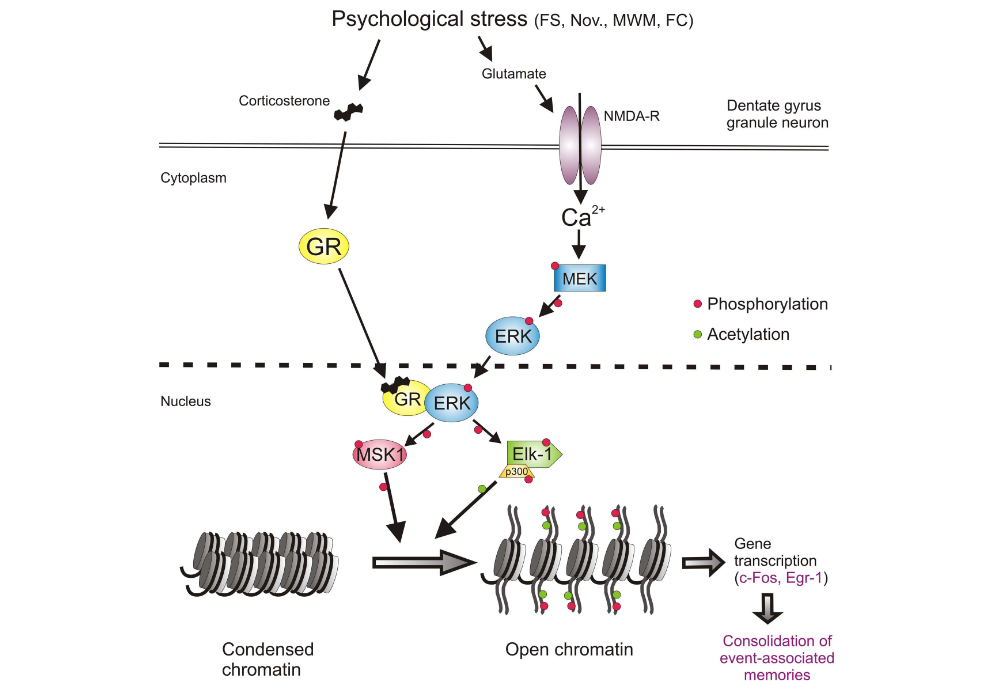
Making memories is crucial for our learning and survival. Our memories are what make us who we are. They shape our personality. Emotional or stressful memories are better remembered than neutral experiences. Traumatic, emotional, and stressful experiences are linked to psychological disorders like anxiety, depression, and PTSD. According to an article published by the National Institutes of Health, a large number of studies have observed that increasing levels of stress is necessary for the formation of long-lasting memories that are stronger and more persistent than normal, neutral memories [2]. The question is, why is this the case? Why do stressful memories lead to stronger connections and how does that lead to psychological disorders? Responses to stressful events produce changes in the brain at the cellular level, leading to measurable changes in brain structure. These changes involve epigenetics, gene transcription, and signaling pathways.
Animal Models
One of the most common tests to measure memory consolidation is the forced swim test in which a mouse will be placed in a tub of water and the amount of time it takes for the mouse to move into an immobile, floating position is measured. What should happen is that when the mouse is reintroduced to the tub it spends less time struggling before moving into a floating position because it remembers that after a certain amount of time, it will be removed from the water.
Researchers observed that glucocorticoids are important for the strengthening of memories regarding a stressful situation. Interestingly, glucocorticoid receptor antagonists administered to only the dentate gyrus in mice produced a delay in the immobility response during the forced swim test.
Epigenetics
This research also prompted the finding of a dual histone mark in granule neurons in the dentate gyrus. This modification happened after experiencing a stressful or traumatic event. The glucocorticoid receptor antagonist also seemed to inhibit the increase of the dual histone mark in the DG neurons after the forced swim test.
The NMDA receptor mediated ERK-MAPK pathway is involved in learning and memory processes. Studies showed that a MEK inhibitor activated the increase of the histone mark, indicating that this pathway was somehow involved. Figure 1 shows a detailed pathway of how the histone mark leads to the upregulated transcription of immediate early genes like c-Fos and Egr-1.

To put it all together we can look at the image above. Stressful, or traumatic events initiate the activation of glucocorticoid receptors and the NMDAR-ERK-MAPK pathway. The activation of the specific molecule ERK1/2 and along with the glucocorticoid receptors activates nuclear kinases that are responsible for the dual histone mark. The formation of this histone mark allows chromatin to decondense and allow the transcription of the immediate early genes. These genes are needed for the consolidation of memory formation and when their expression is upregulated, the memory formation can happen too excessively [1].
Risk Factors and Treatment Options
This phenomenon is only observed in some people who experience a traumatic event or prolonged stress or abuse. Researchers believe that more anxious people are more likely to develop a stress related disorder due to the formation of stronger memories of stressful events. It is unclear why this is the case.
There have been pharmacological approaches studied to utilize the effects of GABAergic drugs since GABA plays a role in modulating anxiety. These drugs resulted in the blockage of the dual histone mark and may be a possible treatment option for anxiety or related disorders in the future. Long term exercise was also found to reduce feelings of anxiety. In some countries, exercise is even prescribed along with traditional pharmacological treatments.
References
- Dong, Y., Taylor, J. R., Wolf, M. E., & Shaham, Y. (2017). Circuit and Synaptic Plasticity Mechanisms of Drug Relapse. The Journal of Neuroscience, 37(45), 10867–10876. https://doi.org/10.1523/JNEUROSCI.1821-17.2017
- Reul, J. M. H. M. (2014). Making Memories of Stressful Events: A Journey Along Epigenetic, Gene Transcription, and Signaling Pathways. Frontiers in Psychiatry, 5. https://doi.org/10.3389/fpsyt.2014.00005